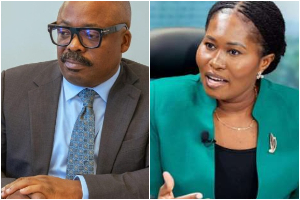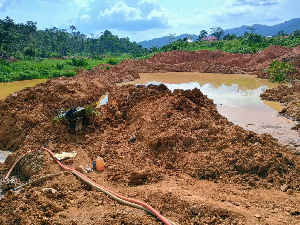Chieftaincy and Culture Minister, Sampson K. Boafo’s recurring discussions for the need for the long-suppressed traditional institutions to be opened and appropriated in the progress of Ghana runs like traditional Kente cloth through the tapestry of recent thinking of Ghanaian progress and development philosophy. Numerous thinkers – Courage Quashigah, Bernard Guri, Sampson Boafo, George Ayitteh, Kofi Akosah-Sarpong, to name a few – have detected a deep-rooted missing links in Ghana’s development process. Nana Nketsia V, Paramount Chief, Asikado Traditional, in Central Region, part of the emerging enlightened traditional rulers, demonstrates the rising development thinking by revealing that traditional institutions serves “as a matrix and a key point for critical self-examination” (July 6, GNA) in Ghana’s progress.
Ghanaian development history demonstrates a struggle to harmonize its huge untapped norms and values with the existing Western neo-liberal values that run Ghana in the face of stern international competition, the constant pull of rough international trade regimes and the abiding tensions of a nation-state created without heavily considering the very values of the 56 ethnic groups that form Ghana. No doubt, Boafo thinks traditional rulers, as key carriers of values and traditions, “are major stakeholders in our governance process, since the vast majority of the people, continued to owe allegiance to the traditional authorities.”
But perhaps the most historically significant fact about Ghana, like it or not, and what has made Ghana’s survival problematic, is the question of “resolving the duality” of the neo-liberal “governance” and “the chieftaincy institutions” in the larger progress of Ghana. Boafo and Guri accurately reasons that “whereas” Ghanaians “were governed by the tenets of the various arms of government and the constitution, they still looked up to the traditional authorities for directives in the areas of development within their communities…There is therefore an urgent need to formulate strategies to address the future of the chieftaincy institutions in the context of their role in governance.” The thinking, whether from Boafo, Guri or any of the emerging new generation of thinkers, is that despite earlier view that Ghana’s development process is unsustainable, and, therefore, a mistake of history, a skillful appropriation of Ghanaian norms, values and traditions, driven by high-level holistic research and policy-making could correct most of the inadequacies in the development process. The view is that you can’t deny Ghana’s inherent tensions or the fact that they have shaped Ghanaians’ sense of progress.
Developmentally, because of the duality of Ghana’s existence, Ghanaians have never really being able to conceptualize Ghana as a development unity and have to think in terms of duality but, more importantly, the tensions in this duality have always been endemic to Ghana. Part of the attempts to resolve this is Boafo and his Culture Ministry conducting consultations with Regional Houses of Chiefs for the founding of a Royal College to assist the engage traditional authorities at diverse levels of progress. The attempt is to rationalize Ghana’s progress for the sake of Ghana’s survival, by constantly experimenting with ways to maintain dynamic balance in the development process in the context of global reality.
This will be situated, as Boafo rationalizes, by putting “in place sound strategies to address the inadequate resources, succession problems, reforms within chieftaincy and relationship between district assemblies and the traditional authorities, which the institution had to grapple with over the years.” The analysis is that in attempting to open up Ghanaian values for progress, the inhibiting values such as chieftaincy conflicts will be refined in order to free the people from the clutches of unnecessary cultural burden.
As part of their developmental duality, Ghanaians, unsure of their elites commitment to mix their norms and values with the neo-liberal ones, as Bernard Guri reasons, have been juggling the neo-liberal values with their indigenous ones, mitigating tensions of the countervailing attractions of the neo-liberal development values, unbalanced national policies and their indigenous ones. Ghanaians have been compensated for the divisions fostered by a multiethnic society with their indigenous norms, values and traditions that are restorative and reconciliatory.
As the emerging Ghanaian development thinkers and the increasing open-minded Chieftaincy and Culture Ministry reveal such circumstances necessitate a constant search for developmental ideas, in an era of untying globalization, that not only transcend Ghanaian norms, values and tradition, but also maintain, uncertainly, Ghana as a nation-state which values seriously counts in its national development planning.















